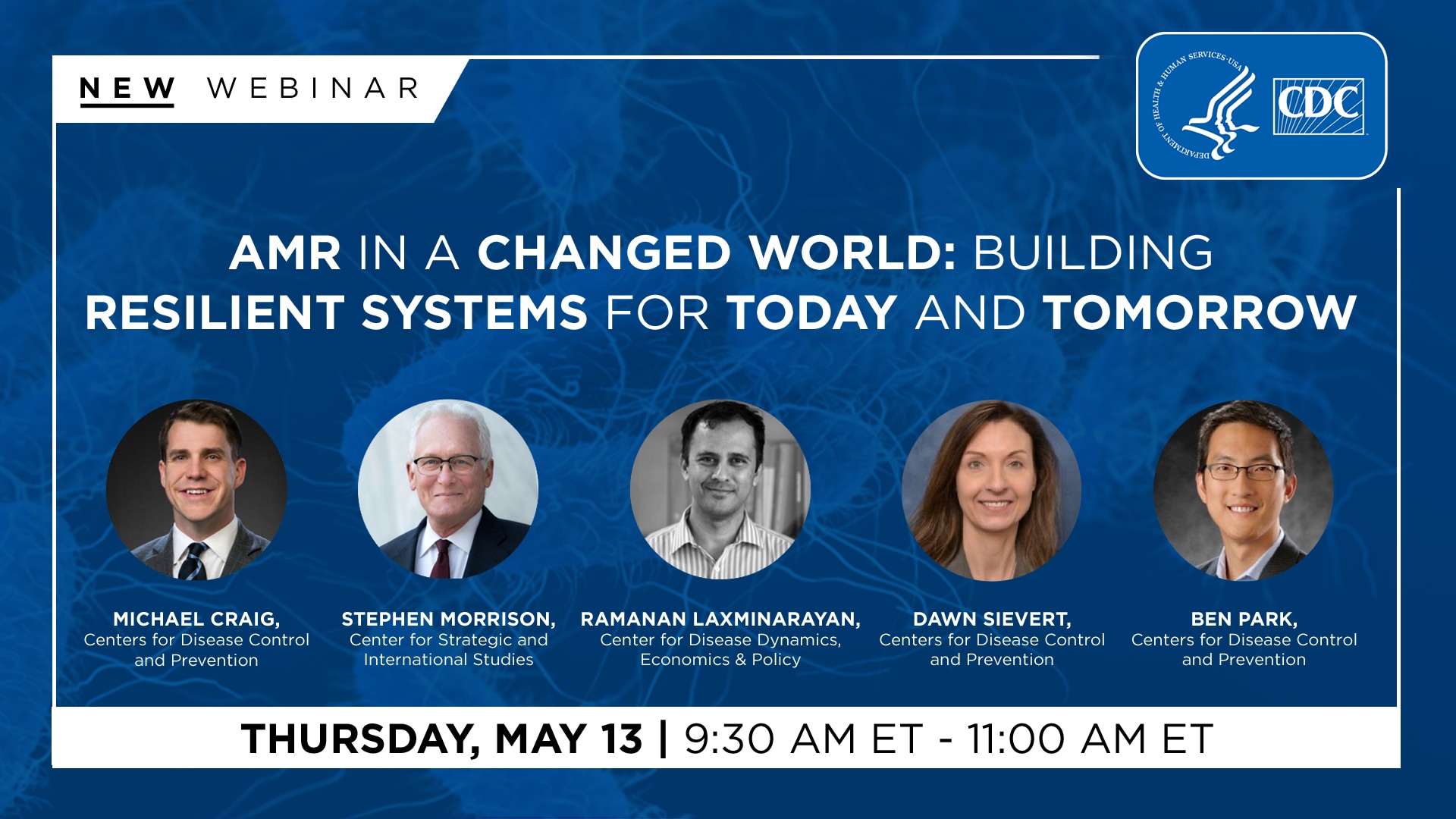CDC & AR experts discuss addressing AR after COVID-19
Posted On: July 2021
- CDC recently sat down with experts to discuss their visions for addressing antibiotic resistance threats in a post-pandemic world.
- Working with partners and having a coordinated, global approach to addressing antibiotic resistance across One Health is imperative.
The global COVID-19 pandemic has made clear that public health and health systems need to be more resilient, flexible, and capable of detecting, containing, and stopping public health threats wherever they start. Antibiotic resistance can spread quickly across healthcare facilities, countries, and the world. It directly threatens modern medicine and our ability to treat common infections. That’s why a coordinated, global partner-driven approach is critical to addressing antibiotic resistance across One Health.
CDC recently sat down with partners to discuss their visions for addressing antibiotic resistance threats post-pandemic, highlighting their own experiences and lessons learned during the past year. Steve Morrison, Senior Vice President of the Center for Strategic and International Studies, emphasized to CDC that antibiotic resistance is a global health security issue put on the back burner during the pandemic like so many other public health threats. Morrison says that as the United States has fewer cases of COVID-19, the country needs to refocus on building public health infrastructure, workforce, and multisectoral partnerships to better prepare and break the cycle of crisis and complacency during public health threats. Morrison also connected his experience working to combat the HIV/AIDS epidemic to that of antibiotic resistance. He says that to address antibiotic resistance in a post-pandemic world, the U.S. needs strong and adaptive leadership, data and accountability to prove successes, sustained yearly funding through bipartisan support from Congress, and a strong coalition of external partners to make change.
On the ground in India, Ramanan Laxminarayan, the founder and Executive Director of the Center for Disease Dynamics, Economics & Policy, joined the conversation to explain his first-hand experience watching COVID-19 spread rapidly through the country. He emphasized that the surge in India was not driven by the virus itself but by insufficient public health preparedness, calling for stronger surveillance and infection prevention and control (IPC) practices. These factors will undoubtedly leave an opportunity for antibiotic resistance to spread nationally and globally unless action is taken across One Health.
Dawn Sievert, Lead Science Advisor for the Antibiotic Resistance Coordination and Strategy Unit at CDC, noted the spread of resistant infections in the United States as the CDC’s Antibiotic Resistance Laboratory Network reported rising infection rates of pathogens that were stable before the COVID-19 pandemic. This rise highlights the plight of healthcare facilities in the U.S., where healthcare staff and standard IPC practices were strained—and as vulnerable patients were placed in overcrowded units—allowing for opportunistic healthcare-associated pathogens, such as carbapenem-resistant Acinetobacter baumannii and Candida auris, to spread. This trend was seen around the world. CDC is scaling up its approach to track antibiotic-resistant pathogens and respond to outbreaks by launching the new Global Antimicrobial Resistance Laboratory & Response Network, which will improve detection and response to antibiotic-resistant threats across One Health in regions around the world.
CDC’s Ben Park, Director of the International Infection Prevention and Control Program, has seen the aftermath of many public health emergencies throughout his career. As he shared, we know what steps need to be taken to shore up the healthcare system in the wake of COVID-19, and we need to focus our efforts on building health systems that can withstand the surge of the next pandemic, when it comes. Park underscored that IPC is the cornerstone of a resilient healthcare system, but these programs take years of work and dedication by healthcare workers to establish. The pandemic overwhelmed health systems domestically and internationally, so many IPC programs lost progress as they lost workers. Park emphasized that IPC is a best buy for public health – an infection prevented is a live saved. That is why CDC is building the upcoming Global Action in Healthcare Network, which will focus on prevention, detection, and response to break the chain of transmission of antibiotic-resistant pathogens and emerging threats in healthcare facilities around the world.
The pandemic is not over, but CDC and its partners are moving forward based on the lessons they’ve learned and experiences over the past year to combat antibiotic resistance across One Health. Listen to the entire discussion led by CDC hereexternal icon and registerexternal icon for the next webinar in the series, Understanding AMR in Water.

CDC experts and partners joined in a discussion to share experiences and vision for addressing antibiotic resistance in a post-pandemic world.